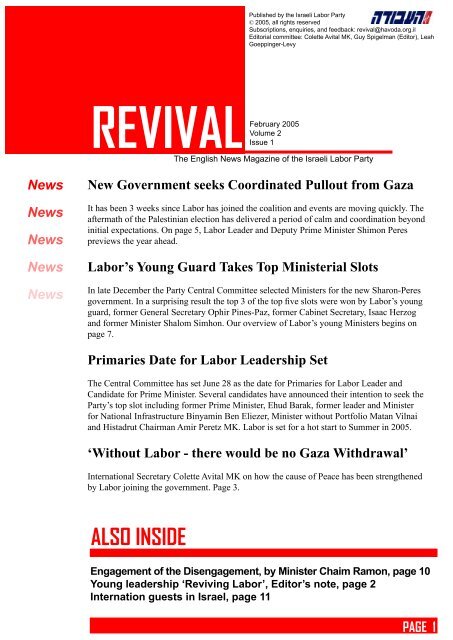February 2005, Volume 2 Issue 1 - Ameinu
February 2005, Volume 2 Issue 1 - Ameinu
February 2005, Volume 2 Issue 1 - Ameinu
You also want an ePaper? Increase the reach of your titles
YUMPU automatically turns print PDFs into web optimized ePapers that Google loves.
REVIVAL PAGE 6The English News Magazine of the Israeli Labor PartyArab democracy. A good clear constitution will help cement the election results and put in place thefoundations for a functioning Palestinian government.Oil-rich Arab countries that have benefited from a windfall of income as a result of the rise in oilprices, and private corporations that hope to prosper in a peaceful two-state environment should layeconomic foundations for Palestinian prosperity now. Financial donations alone will not be effective.The Palestinian economy must be integrated into the global economy through development ofa strong private sector. Private corporations should be financially encouraged by their respectivegovernments to set up branches and activities in Gaza and the Palestinian Authority. A free marketeconomy is an ally of free people.The new state of Palestine will be the homeland of the Palestinian people.Palestinian refugees will return to it and build their homes there. Just as theJewish People will not return to all of the biblical Land of Israel, which isdear to their heart, so too Palestinians will not return to all of historical Palestine,which is dear to their heart.The Palestinian economy should be independent and self-sufficient. It should not depend on Israel.At most, Israelis and Palestinians can trade goods, not people. The European Union should workwith Israel, Jordan and the Palestinians to introduce European norms into the economic relations betweenthe three. This could be the first step towards integration of the three into the EU in a specialform. US Free Trade Zones that have proved themselves in Jordan and Egypt should be expandedto the Palestinians. The UN should support Gaza’s independent economic development and aid in itsrestructuring. The Arab League should become a genuine Arab League for Peace, aiding the cause ofeconomic regional cooperation. Financial Aide is temporary. Economic aide will have sustained impact.Problems are immediate. Solutions take time. But we have to start acting right away. Our immediatepriorities should not relieve us from the need to plan for the day after disengagement.As part of its acceptance of the Roadmap and President Bush’s vision, Israel agreed already torecognize a Palestinian state. Israel agreed to do so first within provisional borders, and later withinpermanent borders as part of a final status agreement. The borders that emerge will have to reflectrealities on the ground. We have a right and an obligation to protect our people, but a reduced threatcan mean a more open border.The new state of Palestine will be the homeland of the Palestinian people. Palestinian refugees willreturn to it and build their homes there. Just as the Jewish People will not return to all of the biblicalLand of Israel, which is dear to their heart, so too Palestinians will not return to all of historicalPalestine, which is dear to their heart. Attempts to translate historical attachment to actual territorialdominance have failed again and again wherever it is tried. We must all learn to live in this world asit is today rather then as it was a hundred or two thousand years ago.The Arab Israeli conflict has concerned the world for over a century. Some of the best, brightest andmightiest individuals have placed their talents, skills and time in the service of resolving the Conflict– to no avail. But there is no substitute for Jews and Arabs, Israelis and Palestinians working togetherto resolve their differences. Ultimately, peace cannot be imposed. Peace should be born out of theinteraction of the two peoples. Others should support peace, but only we, together, can make peace.This is the year ahead. These are the things we should all do. <strong>2005</strong> is a unique year of hope. It shouldbe the year for seizing opportunities, not ignoring them.Sign up & comments: REVIVAL@HAVODA.ORG.ILPAGE 1
REVIVAL PAGE 7The English News Magazine of the Israeli Labor PartyLabor’s Young Guard Takes ChargeThe new Sharon-Peres government has 8 Labor Ministers and 3 Deputy Ministers. Revivalprofiles 3 ministers from Labor’s young guard – who achieved top slots in the Central Committeeelections held in December.Ophir Pines-Paz, Minister of the InteriorOphir Pines-Paz entered the Knesset in 1992. Considered one of theparliament’s most outstanding performers, Pines-Paz has headed theConsitution and Law committee, was coalition chair in Barak’s governmentand served until recently as Labor’s Secretary-General.For the past four weeks I have been serving as the Interior Minister and have discovered thatthis Ministry is both complex and unique. The diversity of subjects the Ministry is responsiblefor is overwhelming including Citizenship, local government, environment and planningmatters, the fire department and the list goes on. After spending much of the month listeningand learning about the various facets of the Ministry I can already state that I look forwardto completely devoting myself to this challenging mission.My primary goal is to turn the Ministry into an office that will be more humane, friendlyand accessible to the public. I am here to serve the public, this is the reason that I waselected and I have every intention to improve the connection between the Interior Ministryand the Israeli public.This leads to my second goal, which is transparency. This is a government office and thereforethe public is entitled to receive all the relevant information that it requires and the highestlevel of service.Israel has a particular problem with regard to the enforcement of government decisions andI intend to implement substantial changes in order to improve the situation. I am also planningto implement a reform of Local Authorities by changing the relationship between localand central governments.It should not be forgotten that the main reason that Labor joined the current government wasthe Disengagement Plan. As a member of the Cabinet I will fight for the implementationof the disengagement and for its transformation from a unilateral plan into a bilateral effortconducted in full cooperation with the Palestinians.Sign up & comments: REVIVAL@HAVODA.ORG.ILPAGE 1
REVIVAL PAGE 8The English News Magazine of the Israeli Labor PartyLabor’s Young Guard Takes ChargeIsaac Herzog, Minister of Housing andConstructionIsaac Herzog entered the Knesset in 2003. A lawyer by trade, Herzogserved as Cabinet Secretary in the Barak Government and headed upIsrael’s anti-Drug authority before entering the Knesset.The challenges that are placed on the shoulders of the Israeli government before the implementationof the Disengagement Plan are greater than many realize. The Ministry of Housingand Construction, that I have the honor to lead, will play an important role in the processand I will provide the Prime Minister with all the necessary assistance in order to implementthe various components of the plan.In addition to facilitating the disengagement, I have begun to change the order of prioritiesat the Housing and Construction Ministry. Regretfully, the priorities that were characteristicof the Ministry over the past few years were reflective of a clear-cut worldview centered onthe preferential treatment and the allocation of resources to settlements in the territories.In the State of Israel, where many citizens find themselves without a roof over their head,where the suffering of the weaker sections of society cries out at us every day, where theperiphery gets second-rate treatment and where women, the elderly, minorities and manyother sectors of society do not have equality of opportunity – the onus is on all of us to bringabout a change.The Ministry of Housing and Construction is primarily a socio-economic ministry thatshould lead policies for the welfare of the public and not for the fulfillment of territorialambitions. Within this framework I plan to the place at the forefront of my priorities assistanceto the Negev, the Galil, development areas and weak towns in the center of the countryalong side the providing of solutions to the predicaments of weak social sectors. The budgetof the Ministry will be directed accordingly, to serve those who really need it.I believe that the Government of Israel, in its current make-up, will succeed in preventingthe worsening of the socio-economic gaps that has led to the fracturing of social solidarityand that has damaged the moral and economic backbone of the State of Israel.Sign up & comments: REVIVAL@HAVODA.ORG.ILPAGE 1
REVIVAL PAGE 9The English News Magazine of the Israeli Labor PartyLabor’s Young Guard Takes ChargeShalom Simhon, Environment MinisterShalom Simhon, a social worker by profession lives on the “confrontationline” (towns located near Israel’s northern border). He beganhis public activities as the Secretary- General of the Moshavim (CooperativeSettlements) Movement in 1993. Simhon was elected to theKnesset (Parliament) in 1996 as a representative of the Moshavim andserved as Chairman of the Finance Committee.In the first government of Prime Minister Sharon, Simhon served as Minister of Agricultureand was a member of the Defense Cabinet.Before being elected as Minister of the Environment, Simhon served a one and a half yearterm as Chairman of the Economics Committee of the Knesset, a position in which hefocused mainly on consumer protection. The Economics Committee headed by Simhonreceived the Prime Minister’s mark for excellence as a result of its contribution towardscreating a business environment supporting growth.Upon his recent appointment as Minister of the Environment, Simhon announced his intentionto address the environmental damage originating from industry, without closing factories.Along these lines air, water and soil pollution will be treated.Simhon is currently negotiating with the Ministry of Finance to increase the budget of theMinistry of the Environment that is bearing fruit.The Minister plans to advance progressive legislation in the Knesset for the protection of theenvironment. He also intends to strengthen the ties between central and local government inorder to increase environmental awareness amongst the local authorities.Filling out the Ministry on behalf of LaborDeputy Prime Minister: Shimon PeresMinister for National Infrastructure: Bejamin Ben EliezerMinister for Communications: Dalia ItzikMinister without Portfolio: Matan VilnaiMinister without Portfolio: Chaim RamonDeputy Minister for Regional Development: Orit NokedDeputy Minister for Housing and Construction: Eli Ben-MenachemDeputy Minister for Education: Rabbi Michael MelciorSign up & comments: REVIVAL@HAVODA.ORG.ILPAGE 1
REVIVAL PAGE 10The English News Magazine of the Israeli Labor PartyThe Engagement of the Disengagement GovernmentMinister without portfolio, Haim Ramon, considered the master-mindbehind the current Unity Government, reflects on his determined pushfor disengagement over the years and the crucial role that Laborneeds to play in implementing the plan during <strong>2005</strong>.Back in October 1987 I proposed a disengagement plan for the Gaza Stripto then Defense Minister Yitzhak Rabin. Almost 20 years ago I was morethan convinced that Israel should withdraw unconditionally – by agreementor unilaterally – from Gaza as soon as possible. In a speech in the KnessetI said: “The State of Israel cannot cope with this problem. We cannotwait anymore – until peace is proposed to us by somebody. Gaza problemsshould be solved separately.” Unfortunately my proposal was not adopted.In 1992, after the inauguration of the Rabin government, I discussed again the proposal with thePrime Minister. Mr. Rabin, who consistently backed initiatives that I led including the Health InsuranceAct and the public health system budget reform, promised me he would thoroughly considerthe disengagement proposal. The Oslo talks caused him to suspend his decision, and the rest ishistory. What was achieved during Rabin’s term was the building of the separation fence along theGreen Line around Gaza.After the collapse of the Camp David talks in 2000 and the outburst of the second Intifada, I presentedto the public two major initiatives: The Separation Fence in the West Bank and the DisengagementPlan from the Palestinians – starting with “Gaza first”.Actually I adopted Ben Gurion’s doctrines with regard to the moral and practical dangers of occupyingthe Gaza Strip and have added to them the security and demographic concepts of the fence alongthe Green Line. Despite this, the initiatives were at first rejected by Labor leadership. It took abouttwo years of tough campaigning to convince the Labor party to adopt the concept of the SeparationFence and the Disengagement from Gaza as its official policy.During this time, Prime Minister Sharon kept rejecting these proposals out of hand despite thesuicide bombers and despite the fact that only 7000 Israeli settlers live in Gaza, surrounded by 1.5million Palestinians. But after a while he decided – due to public pressure – to partially build theSecurity Fence around the West Bank. Later on, in a sudden change of tack he decided to adopt theDisengagement Plan and “Gaza First”.But Mr. Sharon is not in a position to implement the plan without the active support of the LaborParty. The right wing parties and the militant opposition inside his Likud Party will do everything inorder to stop or sabotage the Disengagement Plan. The Labor Party has had to sacrifice its positionas the main opposition party and has shown that it will not let Israel miss the window of opportunitycreated by Sharon’s determination to carry out Labor’s policy and the shift on the Palestinian sidefollowing the election of Abu Mazen as Palestinian leader.We must do all we can in order to bring our soldiers home from Gaza. We must give this new politicalinitiative a chance. History will not forgive us if we do not do not put aside almost everything,disengage from all narrow political interests and do all that is possible to push forward the disengagementwagon.Sign up & comments: REVIVAL@HAVODA.ORG.ILPAGE 1
REVIVAL PAGE 11The English News Magazine of the Israeli Labor PartyInternational guests in Israel1. A meeting of Socialist International (SI) Middle East Committee took place in Jerusalemof Nov 3, 2004, in preparation of the SI Council in South Africa.2. George Papendreou, leader of the PASSOK – visited Israel and met with Shimon Peres on25/11/<strong>2005</strong>.3. Massimo Dalema, leader of the Democratici da Sinistra met with Shimon Peres and MKColette Avital On January 13, <strong>2005</strong>.4. Swedish Foreign Secretary Annika Soder and Ann Linde, International Secretary of theSwedish Socialist Party – participated in the International Women Conference “Peace andreconciliation” (16/12/04).5. A delegation of the British Labour Party led by Ian Lewis, MP, Minister of State for Skillsand Vocational Education visited Israel between January 16 – 21. Other members in the delegation:Meg Munn, MP, Ashuk Kumar, MP, Tony Coleman, MP, Linda Perham, MP, SionSinon MP and Huw Irranca – Davies MP. The delegation met with MK’s Avital, Tamir andSneh as well as Young Labor in Tel Aviv.6. A delegation of the Socialist International led by Luis Ayala acted as observers in thePalestinian National Elections on Feb. 9th. On Feb. 10th the delegation visited the Knesset,met with Shimon Peres and Colette Avital and were present at the swearing in ceremony ofthe new government.7. A senior delegation of the Chinese Communist Party, led by Mr. Wenpu, visited Israelbetween 12 – 18 January. They visited Kibbutz Degania, the Galilee, the Golan Heights andJerusalem. They met with members of the Labor Party (MK Colette Avital, Minister HaimRamon, Ambassador Ora Namir, Mayor Effi Stentzler) and Members of the Likud and CommunistParties.8. A delegation of young SPD members of the Bundestag visited Israel between Feb. 9 - 12.The delegation included MP’s Sigmund Ehrmann, Kerstin Griese, Christian Lange, Dr.Carola Relman and Andreas Weigel. The delegation met leading members of the ILP andconducted a seminar with the young leaderships of the Labour, Likud and Shas parties.9. A delegation of the Socialist group in the European Parlament led by MEP Martin Schultzvisited Israel and the Palestinian Authority on Feb. 2nd. The delegation met with DeputyPrime Minister Shimon Peres. In the Knesset they met with members of the Labor Party factionMK Colette Avital, MK Yuli Tamir, MK Danny Yatom and MK Deputy Minister OritNoked.Sign up & comments: REVIVAL@HAVODA.ORG.ILPAGE 1




